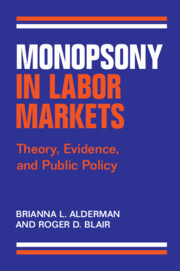
- Cited by 2
-
Cited byCrossref Citations
This Book has been cited by the following publications. This list is generated based on data provided by Crossref.
Burton, Sharon L. 2024. Organizational Readiness and Research. p. 155.
Jirjahn, Uwe 2025. Unions and Collective Bargaining in Sub-Saharan Africa: Some Insights from Quantitative Studies. SSRN Electronic Journal,
- Publisher:
- Cambridge University Press
- Online publication date:
- February 2024
- Print publication year:
- 2024
- Online ISBN:
- 9781009465212
- Subjects:
- Economics, Labour Economics, Macroeconomics


